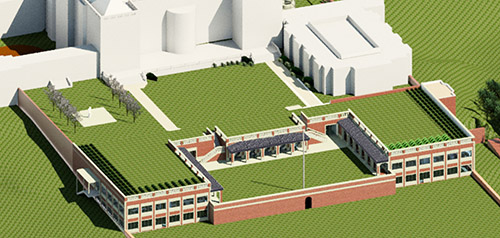Webb Institute to Open A ‘Green’ Academic Center on Long Island Sound
GLEN COVE, NY – Top-ranked engineering college, Webb Institute, will be holding an official ribbon-cutting event for the Couch Academic Center on October 26.
The Couch Academic Center is a state-of-the-art academic facility collocating all academic functions and maximizing student and faculty collaboration. “Hidden” under a green roof and overlooking the Long Island Sound, the academic center features collaborative student project and innovation spaces, integrated student design studios and classrooms, team rooms, computer and innovation/makerspace labs, research center, faculty offices, and a student lounge.

The Couch Academic Center was designed by Dr. Carol and Paul Bentel of Bentel & Bentel Architects.